- Home
- Jojo Moyes
After You Page 27
After You Read online
Page 27
“Of course it’s clean.”
“It needs to be in a suitable condition for a new employee to wear.”
“It was washed yesterday,” I snapped.
I noticed suddenly that there was a new version of Celtic panpipes playing. Fewer harp strings. Heavy on the flute.
“Right. Well, we have some paperwork in the back that you need to sign. I’ll go and get it and you can do that here. And then that’s it.”
“I wondered if I could just have a little word, first? Somewhere a bit more . . . private?”
Richard Percival didn’t look at me. “Too busy, I’m afraid. I have a hundred things to do and I’m one staff member down today.” He bustled past me officiously, counting aloud the remaining bags of scampi fries hanging by the optics. “Six . . . seven . . . Vera, can you serve that gentleman over there, please?”
“Yes, well, that’s what I wanted to talk to you about. I was wondering if there was any way you—”
“Eight . . . nine . . . The wig.”
“What?”
“Where’s the wig?”
“Oh. Here.” I reached into my bag and pulled it out. I had brushed it before putting it in its own bag. It sat, like a piece of blond roadkill, waiting to make some other person’s head itch.
“Did you wash it?”
“Wash the wig?”
“Yes. It’s unhygienic for somebody else to put it on without you washing it first.”
“It’s made of cheaper synthetic fibers than a cut-rate Barbie’s. I assumed it would basically melt in a washing machine.”
“If it’s not in suitable condition for a future staff member to wear I’m going to have to charge you for a replacement.”
I stared at him. “You are charging me for the wig.”
He held it up, then stuffed it back into the bag. “Twenty-eight pounds forty. I will, of course, provide you with a receipt.”
“Oh, my God. You really are going to charge me for the wig.”
I laughed. I stood in the middle of the crowded airport, as the planes took off, and I thought about what my life had become working for this man. And I pulled my checkbook from my bag. “Fine,” I said. “Twenty-eight pounds forty, you say? I tell you what, I’ll round it up to thirty, you know, to include administrative expenses.”
“You don’t need to—”
I scribbled out the check, signed it with a flourish, and slammed it onto the bar in front of him. “You know something, Richard? I like working. If you’d looked beyond your bloody targets for five minutes you would have seen that I was somebody who actually wanted to do well. I worked hard. I wore your horrific uniform, even though it turned my hair static and made small children jig in the street behind me. I did everything you asked, including cleaning men’s loos, which I’m pretty sure was not in my contract, and which, in actual employment law I’m sure should have meant the provision of a hazmat suit at least. I stood in for extra shifts while you searched for new bartenders because you have alienated every single member of the staff who ever came through this door, and I have upsold your wretched dry-roasted peanuts even though they smell like someone breaking wind.
“But I’m not an automaton. I’m human and I have a life, and just for a short while I had responsibilities that meant I couldn’t be the employee you—or I—would have liked. I came here today to ask for my job back—actually, to beg for my job back, as I still have responsibilities and I want a job. I need a job. But I just realized that I don’t want this one. I’d rather work for free than spend another day in this miserable, soul-destroying, panpipe-chuffing bar. I would rather clean toilets for free than work one more day for you.
“So thank you, Richard. You’ve actually prompted my first positive decision in as long as I can remember.” I rammed my checkbook back in my bag, pushed the wig toward him, and made to leave. “You can stick your job the same place you can stick those peanuts.”
I turned back. “Oh, and that thing you do with your hair? All that gel stuff and the perfectly even top thing? Awful. It makes you look like Action Man.”
The businessman sat up on his bar stool and gave a little round of applause. Richard’s hand went involuntarily to his head.
I glanced at the businessman, then back at Richard. “Actually, forget the last bit. That was mean.”
And I left.
I was striding across the concourse, my heart still thumping, when I heard him. “Louisa! Louisa!”
Richard was half walking, half running behind me. I considered ignoring him, but finally came to a halt by the perfume concession. “What?” I said. “Did I miss a peanut crumb?”
He stopped, puffing slightly. He studied the shop window for a few seconds, as if he was thinking. Then he faced me. “You’re right. Okay? You’re right.”
I stared at him.
“The Shamrock and Clover. It’s a horrible place. And I know I’ve not been the greatest to work for. But all I can tell you is that for every miserable directive I give you, my nuts are being squeezed ten times harder by Head Office. My wife hates me because I’m never home. The suppliers hate me because I have to cut their margins every single week because of pressure from shareholders. My regional manager says I’m underperforming on units shifted and if I don’t pull it out of the bag I’m going to get sent to the North Wales Passenger Ferry branch. At which point my wife will actually leave me. And I won’t blame her.
“I hate managing people. I have the social skills of a lamppost, which is why I can’t hang on to anyone. Vera only stays because she has skin like a rhino and I suspect she’s secretly after my job. So there—I’m sorry. I’d actually quite like to give you your job back because, whatever I said earlier, you were pretty good. Customers liked you.”
He sighed and looked out over the milling crowds around us. “But you know what, Louisa? You should get out while you can. You’re pretty, you’re smart, hardworking—you could get something way better than this. If I wasn’t locked into a mortgage that I can barely afford, a baby on the way, and payments on a fricking Honda Civic that makes me feel about 120 years old, believe me, I’d be taking off out of here faster than one of those planes.” He held out a hand with a payslip. “Your holiday pay. Now go. Seriously, Louisa. Get out.”
I looked down at the little brown envelope in my hand. Around us the airport passengers moved at a crawl, pausing at outlet windows, checking for vanished passports, oblivious to what was going on in their midst. And I knew suddenly with a weary inevitability what was going to happen.
“Richard? Thanks for that, but . . . could I still have the job? Even if it’s just for a bit? I do actually really need it.”
Richard looked at me as if he couldn’t believe what I was saying. Then he let out a sigh. “Actually, if you could do a couple of months it would be a massive relief. I’m right up the proverbial creek here. In fact, if you could start now I could make it over to the wholesalers to pick up the new beer mats.”
We stared at each other, then slowly swapped places—a little waltz of mutual disappointment.
“I’ll call home,” I said.
“Oh. Here,” he said. We gazed at each other a moment longer, and then he slowly reached out and handed me the plastic bag containing my uniform. “I guess you’ll be needing this.”
• • •
Richard and I settled into a routine of sorts. He treated me with a little more consideration, only asking me to do the Gents on the days when Noah, the new cleaner, failed to turn up, not commenting if he thought I was spending too long talking to customers (even if he did look a bit pained), and in turn I was cheerful and punctual and careful to upsell when I could. I now felt an odd responsibility toward his nuts.
On Wednesday Richard took me to one side and said that, while it was possibly a little premature, Head Office had told him that they were looking to elevate one of the permanent staff to an assistant managerial position and if things carried on as they were he felt very much inclined to put my name forward.
(“I can’t risk promoting Vera. She’d put floor cleaner in my tea to get my job.”) I thanked him and tried to look more delighted than I felt.
Lily, meanwhile, asked Samir for a job, and he said he would take her for a half-day’s trial if she would do it for free. I handed her a coffee at seven thirty, and made sure she left the flat dressed and ready in time for her eight o’clock start. When I returned home that evening, she had apparently got the job, albeit at £2.73 an hour, which I discovered was the lowest rate he could legally pay her. She had spent most of the day moving crates in the back storeroom and putting prices on tins with an ancient sticker gun, while Samir and his cousin watched football on his iPad. She was filthy and exhausted, but curiously happy. “If I last a month he says he’ll consider putting me on the till.”
• • •
I had a shift change, so on Thursday afternoon we drove to Lily’s parents’ house in St. John’s Wood, and I waited in the car while Lily went in and collected some more clothes and the Kandinsky print that she had said would look good in my flat. She emerged twenty minutes later, her face furious and closed. Tanya walked out onto the porch, her arms folded, watching silently as Lily opened the boot and threw in an overstuffed carryall and then, more carefully, the print. Then she climbed into the front seat and gazed straight ahead at the empty road. As Tanya turned away and closed the door behind her, I could not be sure, but there was a small possibility she was wiping her eyes.
I put my keys in the ignition.
“When I grow up,” Lily said finally, and perhaps only I could have detected the faint tremor in her voice, “I am not going to be anything like my mother.”
I waited a moment, then started the car and we drove in silence back to my flat.
Fancy the pictures tonight? I could do with some escapism.
I don’t think I should leave Lily.
Bring her?
I’d better not. Sorry, Sam x
That evening I found Lily out on the fire escape. She looked up at the sound of the window opening and waved a cigarette. “Thought it was a bit mean to keep smoking in your flat, given that you don’t.”
I wedged the window open, climbed out carefully, and sat down on the iron steps beside her. Below us the car park simmered in the August heat, the scent of hot Tarmac rising into the still air. A car with the bonnet up thumped bass from its sound system. The metal of the steps retained the warmth of a month of sunny afternoons and I leaned back and closed my eyes.
“I thought it would all work out,” Lily said.
I opened them again.
“I thought if I could just get Peter to go away all my problems would be solved. I thought if I could find my dad that I would feel like I belonged somewhere. And now Peter’s gone, and Garside’s gone, and I know about my dad, and I have you. But nothing feels like I expected.”
I was about to tell her not to be silly. I was about to point out that she had come such a long way in a short time, that she had her first job, prospects, a bright future—the standard adult responses. But they all seemed trite and patronizing.
I looked out at the end of the road, where a bunch of office workers were huddled around a metal table by the rear door of the pub. Later tonight it would be packed with hipsters and strays from the City, spilling out across the pavement, drinks in hand, their raucous calls filtering in through my open window. “I know what you mean,” I said. “I’ve been waiting to feel normal again since your dad died, but I’m basically just going through the motions. I’m still in a crappy job. I still live in this flat, which I don’t think is ever going to feel like home. I had a near-death experience, but I can’t say it gave me wisdom or gratitude for life or anything. I go to a grief-counseling group full of people who are as stuck as I am. But I haven’t really done anything.”
Lily thought about this. “You helped me.”
“That’s pretty much the one thing I hang on to most days.”
“And you have a boyfriend.”
“He’s not my boyfriend.”
“Sure, Louisa.”
We watched the traffic crawl down toward the City. Lily took a final drag of her cigarette, then stubbed it out on the metal step.
“That’s my next thing,” I said.
She had the grace to look slightly guilty. “I know. I will stop. I promise.”
Across the rooftops the sun had started to slide, its orange glow diffused by the lead-gray air of the city evening.
“You know, Lily, perhaps some things just take longer than others. I think we’ll get there, though.”
She linked her arm through mine and let her head rest on my shoulder. We watched the sun’s gentle fall, and the lengthening shadows creeping toward us, and I thought about the New York skyline and the fact that nobody was truly free. Perhaps all freedom—physical, personal—really only came at the cost of somebody or something else.
The sun vanished, and the orange sky began to turn petrol blue. When we finally stood up, Lily smoothed her skirt, then gazed at the packet in her hand. She pulled the remaining cigarettes abruptly from the wrapper and snapped them in half, then sprinkled them into the air, a confetti of tobacco and white paper. She looked at me triumphantly and held up her hand. “There. I am officially a smoke-free zone.”
“Just like that.”
“Why not? You said it all might take longer than we thought. Well, that’s my first step. What’s yours?”
“Oh, God. Maybe I’ll persuade Richard to let me stop wearing that god-awful nylon wig.”
“That would be an excellent first step. It would be nice not to get an electric shock off every door handle in your flat.”
Her smile was infectious. I took the empty packet of cigarettes from her hand before she could litter the car park with that too, and stood back so she could climb inside. She stopped and turned to me, as if she had suddenly thought of something. “You know, you don’t have to be sad just to stay connected to him.”
I stared at her.
“My dad. It’s just a thought.” She shrugged, and climbed back in through the window.
• • •
I woke the next day to find that Lily had already gone to work. She’d left a note saying she would bring some bread home at lunchtime as we were a bit short. I had drunk some coffee, had breakfast, and put on my trainers to go for a walk (Marc: “Exercise is as good for your spirit as it is for your body!”) when my mobile rang—a number I didn’t recognize.
“Hello!”
It took me a minute. “Mum?”
“Look out your window!”
I walked across the living room and gazed out. My mother was standing down on the pavement waving vigorously.
“What—what are you doing here? Where’s Dad?”
“He’s at home.”
“Is Granddad okay?”
“Granddad’s fine.”
“But you never come to London by yourself. You don’t even go past the petrol station without Dad in tow.”
“Well, it was about time I changed, wasn’t it? Shall I come up? I don’t want to use up all the minutes on my new phone.”
I buzzed her in and went around the living room clearing the worst of last night’s dishes, and by the time she reached the door I was standing there, arms open, ready to greet her.
She was wearing her good anorak, her handbag slung satchel-style over her shoulder (“Harder for muggers to snatch it”), and her hair styled into soft waves around her neck. She was beaming, her lips carefully outlined in a coral-pink lipstick, and clutching the family A–Z, which dated back to some time around 1983.
I stared at her. “I can’t believe you came by yourself.”
“Isn’t it wonderful? I actually feel quite giddy. I told a young man on the tube that it was the first time I’d been on the Underground in thirty years without someone holding my hand and he moved a full four seats down the carriage. I got quite hysterical with laughter. Will you put the kettle on?” She sat, pulling off her coat, and gazed at
the walls around her. “Well, now. The gray is . . . interesting.”
“Lily’s choice.” I wondered fleetingly if this was some great joke and Dad was about to barrel in through my front door, laughing at what a great eejit I was, believing that Josie would come anywhere by herself. I put a mug down in front of her. “I don’t understand. Why did you come without Dad?”
She took a sip of the tea. “Oh, that’s lovely. You always did make the best cup of tea.” She put it on the table, carefully sliding a paperback book under it first. “Well. I woke up this morning and I thought about all the things I had to do—put a wash on, clean the back windows, change Granddad’s bedding, buy toothpaste—and I just suddenly thought, Nope. I can’t do it. I’m not going to waste a glorious Saturday doing the same thing I’ve done for thirty years. I’m going to have an adventure.”
“An adventure.”
“So I thought we could go to a show.”
“A show.”
“Yes—a show. Louisa, have you turned into a parrot? Mrs. Cousins from the insurance brokers says there’s a stall in Leicester Square where you can buy cheap tickets on the day, for shows that aren’t full. I was wondering if you’d like to come with me.”
“What about Treena?”
Mum waved a hand. “Oh, she was busy. So what do you say? Shall we go and see if we can get some tickets?”
“I’ll have to tell Lily.”
“Then go and tell her. I’ll finish my tea, you can do something with that hair of yours, and we’ll head off. I’ve got a one-day travelcard, you know! I might just hop on and off the Underground all day!”
• • •
We got half-price tickets to Billy Elliot. It was that or a Russian tragedy, and Mum said she’d been funny about Russians ever since someone had given her cold beet soup and told her that was how the Russians ate it.
She sat rapt beside me for the entire performance, nudging me and muttering at intervals, “I remember the actual miners’ strike, Louisa. It was very hard on those poor families. Margaret Thatcher! Do you remember her? Oh, she was a terrible woman. Always had a nice handbag, though.” When the young Billy flew into the air, apparently fueled by his ambitions, she wept quietly beside me, a fresh white handkerchief pressed to her nose.
I watched the boy’s dance teacher, Mrs. Wilkinson, a woman whose ambitions had never lifted her beyond the confines of the town, and tried not to see anything of my own life. I was a woman with a job and a sort-of boyfriend, sitting in a West End theater on a Saturday afternoon. I totted these things up as if they were little victories against some foe I couldn’t quite identify.
We emerged into the afternoon light dazed and emotionally spent. “Right,” said Mum, tucking her handbag firmly under her arm (some habits died hard). “Tea at a hotel. C’mon. We’ll make a day of it.”
We couldn’t get into any of the grand ones, but we found a nice hotel near Haymarket with a tea selection that Mum approved of. She asked for a table in the middle of the room and sat there gazing around her and remarking on every person who walked in, noting their dress, whether they looked like they came from “abroad,” their lack of wisdom in bringing small children, or little dogs that looked like rats.
“Well, look at us!” she would exclaim every now and then, when it grew quiet. “Isn’t this nice?”
We ordered English Breakfast tea (Mum: “That’s just posh for normal tea, yes? None of those weird flavors?”) and the “Afternoon Tea Fancy Plate,” and we ate tiny crustless sandwiches, little scones that weren’t as good as Mum made, and cakes in gold foil. Mum talked for half an hour about Billy Elliot and how she thought we should all do this once a month or so and she bet that my father would love it if we could actually get him down here.
“How is Dad?”
“Oh, he’s fine. You know your father.”
I wanted to ask, but was too afraid. When I looked up, she was gazing at me a little beadily. “And no, Louisa, I am not doing my legs. And, no, he’s not happy. But there are more important things in life.”
“What did he say about you coming here today?”
She snorted, and covered it up with a little coughing fit. “He didn’t believe I was going to. I told him about it when I brought him up his tea this morning, and he started to laugh, and if I’m honest with you it annoyed me so much I got dressed and I just went.”
My eyes widened. “You didn’t tell him?”
“I already had told him. He’s been leaving messages on this phone thing all day, the eejit.” She peered at the screen, then tucked it neatly back into her pocket.

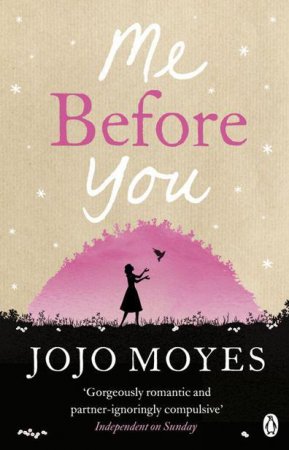 Me Before You
Me Before You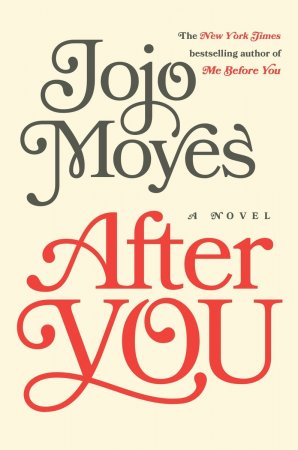 After You
After You The Last Letter From Your Lover
The Last Letter From Your Lover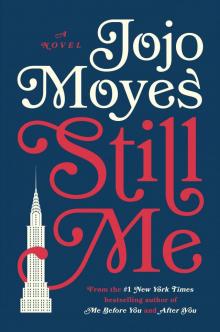 Still Me
Still Me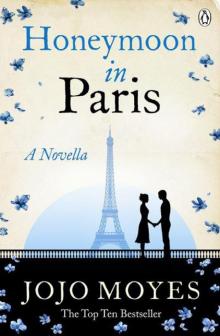 Honeymoon in Paris
Honeymoon in Paris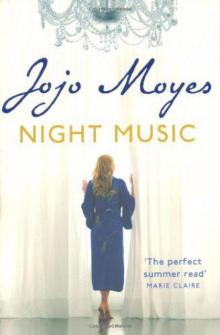 Night Music
Night Music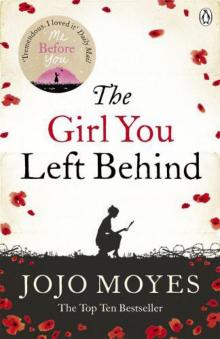 The Girl You Left Behind
The Girl You Left Behind Windfallen
Windfallen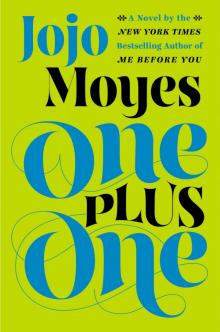 One Plus One
One Plus One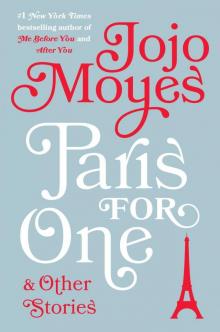 Paris for One and Other Stories
Paris for One and Other Stories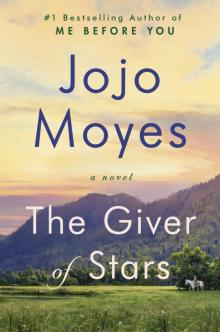 The Giver of Stars
The Giver of Stars The Ship of Brides
The Ship of Brides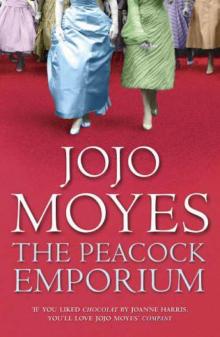 The Peacock Emporium
The Peacock Emporium Silver Bay
Silver Bay The Horse Dancer
The Horse Dancer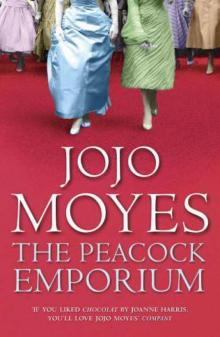 Peacock Emporium
Peacock Emporium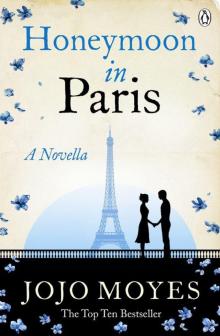 Honeymoon in Paris: A Novella
Honeymoon in Paris: A Novella Ship of Brides
Ship of Brides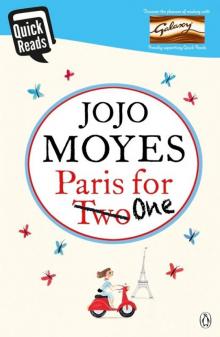 Paris For One (Quick Reads)
Paris For One (Quick Reads)